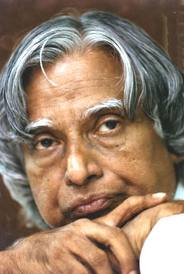Friday, July 31, 2015
Tuesday, July 28, 2015
R.I.P.Dr.A.P.J.Kalam....
28.07.2015
R.I.P.Dr.A.P.J.Kalam....
Avul Pakir Jainulabdeen Abdul
Kalam (
i/ˈæbdʊl kəˈlɑːm/; 15
October 1931 – 27 July 2015) was the 11th President of India from
2002 to 2007. A career scientist turned reluctant politician, Kalam was born
and raised in Rameswaram, Tamil Nadu and studied physics and
aerospace engineering. He spent the next four decades as a scientist and
science administrator, mainly at the Defence Research and
Development Organisation (DRDO)
and Indian Space Research
Organisation (ISRO)
and was intimately involved in India's civilian space program and military missile development
efforts.[1] He thus came to be known as the Missile Man of India for his work on the development of ballistic
missile and launch
vehicle technology.[2] He also played a pivotal organizational,
technical and political role in India's Pokhran-II nuclear tests in 1998, the first since
the original
nuclear test by India in
1974.[3]
Kalam was elected President of
India in 2002 with the support of both the ruling Bharatiya Janata
Party and the
opposition Indian National Congress. After
serving a term of five years, he returned to his civilian life of education,
writing and public service. He received several prestigious awards, including
the Bharat
Ratna, India's highest civilian honour.
Awards and
honours
Kalam's 79th birthday was recognised as World Student Day by the United Nations.[80] He has also received honorary doctorates from 40 universities.[81][82] The Government of India has honoured him with the Padma Bhushan in 1981 and the Padma Vibhushan in 1990 for his work with ISRO and
DRDO and his role as a scientific advisor to the Government.[83] In 1997, Kalam received India's highest civilian honour, the Bharat Ratna, for his contribution
to the scientific research and modernisation of defence technology in India.[84] In 2005, Switzerland declared 26 May as "Science Day"
to commemorate Kalam's visit to the country.[85] In 2013, he was the recipient of the Von Braun Award from the National Space Society "to recognize excellence in the management and leadership
of a space-related project."[86]
|
Year of
award or honour
|
Name of
award or honour
|
Awarding
organisation
|
|
2014
|
||
|
2012
|
Doctor of Laws (Honoris Causa)
|
|
|
2011
|
||
|
2010
|
||
|
2009
|
||
|
2009
|
||
|
2009
|
International von Kármán Wings
Award
|
|
|
2008
|
Doctor of Engineering (Honoris Causa)
|
|
|
2007
|
King Charles II Medal
|
|
|
2007
|
Honorary Doctorate of Science
|
|
|
2000
|
||
|
1998
|
||
|
1997
|
||
|
1997
|
||
|
1994
|
Distinguished Fellow
|
|
|
1990
|
||
|
1981
|
Tuesday, July 21, 2015
રામાયણમાં રહીમ ને કુરાનમાં કૃષ્ણ – હાર્દિક યાજ્ઞિક
૨૧.૦૭.૨૦૧૫....આજે એક ગમતીલી કવિતા....
રામાયણમાં રહીમ ને કુરાનમાં કૃષ્ણ – હાર્દિક યાજ્ઞિક
ચાલ ગરબડ જરા ગ્રંથોમા કરી
જોઇએ,
રામાયણમાં રહીમ ને કુરાનમાં કૃષ્ણ લખી જોઈએ.
રામાયણમાં રહીમ ને કુરાનમાં કૃષ્ણ લખી જોઈએ.
ફરક શું પડશે એમા એમની મહાનતા
ને,
ચાલ અદલાબદલી ઉપરવાળાની કરી જોઈએ.
ચાલ અદલાબદલી ઉપરવાળાની કરી જોઈએ.
આઝાન પછી મંદિર ને દેવળે
દેવાય,
ને મસ્જીદમા આરતી અલ્લાહની કરી જોઈએ.
ને મસ્જીદમા આરતી અલ્લાહની કરી જોઈએ.
મૂર્તિં આગળ મહોમ્મદની પછી,
થોડી ચાલીસા પયગમ્બરની કરી જોઈએ.
થોડી ચાલીસા પયગમ્બરની કરી જોઈએ.
શયન મંગળા મસ્જીદને સોંપી,
નમાઝ કૃષ્ણના નામની પઢી જોઈએ.
નમાઝ કૃષ્ણના નામની પઢી જોઈએ.
જ્યાં ન હોય કોઇ બંધન ને ફતવા,
ચાલને એવો કોઇ ધર્મ જીવી જોઈએ.
ચાલને એવો કોઇ ધર્મ જીવી જોઈએ.
ચાલ ગરબડ જરા ગ્રંથોમા કરી
જોઇએ,
રામાયણમા રહીમ ને કુરાનમાં કૃષ્ણ લખી જોઈએ.
રામાયણમા રહીમ ને કુરાનમાં કૃષ્ણ લખી જોઈએ.
- હાર્દિક યાજ્ઞિક
Subscribe to:
Comments (Atom)











